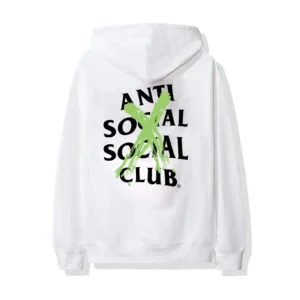
The Anti Social Social Club (ASSC) has long been a brand that thrives on mystery, exclusivity, and the magnetic pull of streetwear culture. Founded by Neek Lurk in 2015, the label quickly evolved from a niche Instagram experiment into a global streetwear phenomenon. Yet, behind the bold graphics, sold-out drops, and cultural hype, the brand’s founder has openly reflected on one of his biggest regrets—a decision that shaped both the trajectory of ASSC and his personal life.
The Meteoric Rise of Anti Social Social Club
Before discussing the regret, it’s essential to understand the context. Neek Lurk launched ASSC at a time when streetwear was beginning its mainstream takeover. Social media amplified its growth—early adopters, celebrities, and influencers proudly wore the brand, making it an instant status symbol.
The logo itself—simple, slightly melancholic, and emotionally charged—spoke to a generation grappling with social disconnection despite being hyper-connected online. The brand’s early drops sold out in minutes, feeding into a scarcity-driven hype model.
From Passion Project to Global Business
Initially, ASSC was a personal outlet for Neek’s emotions and creative energy. Each design came from a place of authenticity—reflecting personal struggles, mood swings, and relationships. The brand was raw, relatable, and unapologetically real.
However, as sales surged, the company’s operations shifted from small-scale fulfillment to global logistics. Partnerships with major retailers and collaborations with brands like Nike, BAPE, and Playboy brought new opportunities, but also new challenges.
The Founder’s Biggest Regret: Losing Creative Control
Neek’s biggest regret, as revealed in various interviews, was losing full creative and operational control over ASSC.
In the early days, every product drop was deeply personal. But as the brand expanded, business obligations, supply chain pressures, and partnership demands started shaping the creative process. Instead of designing purely from emotional inspiration, Neek often had to consider commercial viability, production deadlines, and contractual obligations.
This shift diluted some of the raw authenticity that made ASSC resonate so powerfully with its audience in the beginning.
The Toll of Rapid Expansion
The speed of ASSC’s growth was both its greatest strength and its biggest challenge. While rapid expansion brought global recognition, it also created customer service issues, shipping delays, and quality control challenges—problems that quickly became public due to the brand’s massive online presence.
Neek has expressed regret that in the rush to scale, the brand’s original intimate connection with its community was strained. Many fans began to feel that the personal, almost diary-like tone of the brand was overshadowed by corporate decisions.
Emotional Branding vs. Business Reality
ASSC was never just about hoodies and caps—it was about a lifestyle and mindset. The brand’s appeal was rooted in its emotional storytelling, where each drop seemed like a snapshot of Neek’s own inner world.
But as the business side took over, that emotional storytelling had to compete with seasonal calendars, investor expectations, and market trends. This shift left Neek questioning whether the compromises made for growth were worth it.
The Struggle Between Independence and Collaboration
One of the founder’s dilemmas—and eventual regrets—was how partnerships and collaborations influenced the brand’s identity. Collaborating with big names expanded ASSC’s reach but also forced it to adapt to outside branding guidelines and production constraints.
While these collaborations boosted visibility, they sometimes moved the brand away from its core aesthetic and the personal tone that early fans cherished.
Lessons from ASSC’s Journey
Neek’s reflections offer valuable lessons for creative entrepreneurs:
- Scaling too quickly can compromise authenticity.
- Creative control is hard to regain once lost.
- Customer connection should be protected at all costs.
- Partnerships need to align with the brand’s original vision.
These insights reveal that behind every hyped brand, there are difficult trade-offs between artistic integrity and commercial success.
The Legacy of Anti Social Social Club
Despite the regrets, ASSC remains a powerhouse in streetwear. The brand’s limited-edition model continues to generate anticipation, and its global fan base remains strong.
Neek’s openness about his regrets humanizes him in an industry that often glorifies success without acknowledging the sacrifices it requires. His story reminds us that behind the hype are human emotions, personal struggles, and tough decisions.
Looking Ahead: The Future of ASSC
Today, the brand stands at a crossroads—balancing the demands of a global audience with the desire to return to its emotional, authentic roots. Whether Neek can recapture the raw creativity that made ASSC iconic remains to be seen.
However, his willingness to admit mistakes and express vulnerability may pave the way for a more transparent, community-focused future for the brand.
Final Thoughts
The story of Anti Social Social Club and its founder’s biggest regret is more than just a business tale—it’s a reminder of the fine line between passion and pressure, art and commerce, authenticity and scalability.


